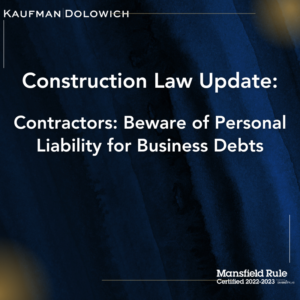Contractors: Beware of Personal Liability for Business Debts, by Andrew L. Richards, Esq. ,11-6-2023
 Litigation arising from construction disputes can get expensive quickly, particularly as litigation costs continue to rise. In fact, the average value of construction disputes in 2022 rose to a record high of $42.8 million compared to $30.1 million in 2021, a 42% increase, which reflects in part the growing complexity of projects and inflationary pressures, according to a study by Arcadis, an engineering consulting firm.
Litigation arising from construction disputes can get expensive quickly, particularly as litigation costs continue to rise. In fact, the average value of construction disputes in 2022 rose to a record high of $42.8 million compared to $30.1 million in 2021, a 42% increase, which reflects in part the growing complexity of projects and inflationary pressures, according to a study by Arcadis, an engineering consulting firm.
To be sure, many contractors can go years avoiding costly claims, but at some point litigation becomes unavoidable as your firm grows and works on more and more projects. With rising litigation costs, some companies may not have the ability to pay compensatory damages if they are found to be liable. Subsequently, they may have been advised just to close shop and set up a new company with the rationale that the owners and officers would be shielded from personal liability because the company is a corporation or limited liability company.
But that’s not necessarily the case and you can still be on the hook for damages personally.
Uniform Voidable Transactions Act
There are statutes in the New York State Debtor and Creditor Law that provide for personal liability for corporate debts in some circumstances. The Uniform Voidable Transactions Act (UVTA) provides that a transfer of assets is voidable if a debtor:
- transfers assets with the intent of hindering, delaying or defrauding any creditor (actual fraud) or,
- does not receive a reasonably equivalent value in exchange for the transfer and the debtor (a) was or was about to engage in a transaction which would leave the remaining assets unreasonably small in relation to the business or (b) intended to incur or should have known that the debtor would incur debts beyond the debtor’s ability to pay as they became due. This is considered constructive fraud and can occur even if the debtor had no intention to deceive another party. It is still considered fraud under the law because the outcome is the same as if actual fraud occurred.
In determining a debtor’s actual intent to hinder a creditor, a court may take into account, among other things whether: the transfer was made by an insider; the debtor retained possession of the asset; the debtor was sued or was threatened with a suit before the transfer was made; the debtor became insolvent after the transfer was made; or the consideration received by the debtor was unreasonably equivalent to the value of the asset transferred.
Consider that tactics such as changing the deed of your house to your mother, moving assets from the debtor to a new company, and taking money out of the company even if it was for repayment of a loan when you have been sued, will not help you avoid paying a debt. The bottom line is that there are a lot of facets to UVTA, and you cannot just assume closing down a business and opening up another one will allow you to avoid paying damages.
Kaufman Dolowich Can Help
If you need assistance in determining if you can simply close your company to avoid paying debts, Kaufman Dolowich’s team of skilled construction and commercial litigation attorneys can assist.










